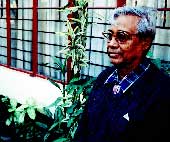 |
| Arun Sarma. Picture by S.H. Patgiri |
Arun Sarma
Some dreams are born when very young, sprouting out of kernels of awe and thrill. Long ago, playwright-novelist Arun Sarma’s did too — taking flight from a monologue that echoed and bounced around an empty theatre. Sarma was a child, a carefree spirit whose wishes flit like butterflies in a spring garden. One evening, during a chance peek inside Tezpur’s famous Ban Theatre, time and desire came to a still.
The young one had espied his calling. Sarma recalls, “I was skipping home I remember, when I heard a voice rise and fall in passion. Poking my head around a door left ajar, I found Phani Sarma, a great name in drama, rehearsing Shah Jahan’s role. The hall was empty, but the master actor’s speech rung on regardless. The thrill of those few moments stayed on....”
It was later to be recaptured in Sarma’s magnum opus Nibaran Bhattacharyya — where the eponymous character reels out a long monologue in an empty theatre — which was honoured with the best Assamese play by the Asam Sahitya Sabha in both 1966 and 1967.
The same play in English has also been included in a Sahitya Akademi-anthology entitled Hundred Years of Modern Indian Literature.
Nibaran Bhattacharyya, a play, that in spite of its underlying agony pays tribute to the final triumph of the human spirit, also epitomises Sarma’s life philosophy. Sans ersatz, sans any yearning for reward. “When I put pen to paper, I do so to express my feelings and perception of life. Sometimes I quite forget that troupes would want to stage my plays and that stage adaptations could become difficult,” muses the playwright, recently awarded the Sangeet Natak Akademi for his contribution to the art of theatre.
The dramatist, however, has not let this penchant for letting his pen flow unfettered damp the desire of drama troupes to mount his works. The latter find in him a beloved guide who patiently weaves around the scenes of his plays for adaptations on stage.
Incidentally, Sarma is the third Indian and the first Assamese to be honoured with both Sangeet and the Sahitya Akademi, the latter for his wonderfully poignant novel Ashirbadar Rang (1998). “They were newer born. Writing novels happened by chance. I was once requested by Phani Talukdar, the then assistant editor of Dainik Asom — also a person who has constantly inspired me — to send a drama for their special Puja issue. The drama did not materialise, instead a short novel did. It was published, appreciated and...” smiles Sarma.
The dramatist-writer writes both plays and novels with exemplary ardour, their ideas “evolving often from real-life experiences”.
He deftly laces the weft of individual experiences into the larger social context to spin a tapestry of tales and dramas that speak of man in different life situations. Arshirbadar Rong for example, was drawn from the lingering memories of Sarma’s personal experiences lived in rural Assam in the period between 1935 and 1947. The litterateur’s essentially humanist philosophy, however, has not allowed him to ignore social and political realities.
His repertoire, hence, includes among others, Burunjipath, a satire on the emergency period during former Prime Minister Indira Gandhi’s regime, and also Anya Ek Adhyay, drawn as Sarma puts it, from a “universal context”.
Sarma wrote his first play as early as in 1952, while still in college — albeit it was first staged in Tezpur’s Ban Theatre in 1955, a year after his graduation.
In 1956, the play also graced the dais at the Bhaskar Natya Mandir in Guwahati. And perhaps because he began with theatre, continuing with them for most part of his career at the All India Radio, that even now it is drama that effortlessly pours forth from his plume.
“The urge to write plays and novels is equally intense; only that theatre has become an old habit,” laughs the playwright, who is at present also president of the Asam Natya Sanmilan.
Sarma has written and broadcast 42 radio plays for All India Radio, including its national programme. He also has nine published plays and 10 dramas published in significant literary journals to his credit.
“Usually I write well when under pressure. When I was with AIR, I often used to get down to write only after being informed of the schedule. Rarely have I written at leisure. Over the years I have found that I relate better to my inner thoughts when constrained by time,” muses the writer, whose children’s play The Selfish Prince was included in the platinum network of the British Broadcasting Corporation (BBC) as the model programme being used in staff training courses.
Sarma has also written Stabhor, the first science play of the AIR network. The play’s novelty and position — created in the backdrop of inter-planetary interaction between Neptune, Mars and Earth at a time when the Earth had discarded its atomic weapons — was discovered at a seminar for young playwrights in Calcutta. For Sarma, who had written the piece on a short deadline, the discovery was pure joy.
With time though, Sarma has learnt to take it a “little easy”, putting the brakes on the earlier fast pace. Quoting from Ingmar Bergman’s The Fifth Act, which he says explains his current view of life perfectly, he says, “To read silently has become difficult for me for as long as I can remember. I read carefully, slowly. If I try to pick up the pace, the whole thing falls apart at once. I lose the thread.”
The playwright-writer has been honoured with several awards over the years. From the Japan Prize International for his radio documentary All Buds To Bloom, the Asia-Pacific Broadcasting Union Award for another radio documentary Caution: Danger Ahead to the Akashvani Award for Kukurnechina Manuh, and the Asom Natya Sanmilan Award and the Sanglap Samman for the “Most Important Playwright in the Assamese Language”, Sarma has been bestowed with honours as profuse and dignified as his writings.
At the end of the day though, Sarma still feels that he has not written his magnum opus, “my swan song”, as he puts it.
However, by being recognised by both the Sahitya and Sangeet Akademi awards the dramatist-litterateur now feels impelled to create a great work. “I now feel committed to write a play that will honour the coveted award given to me,” he says.











